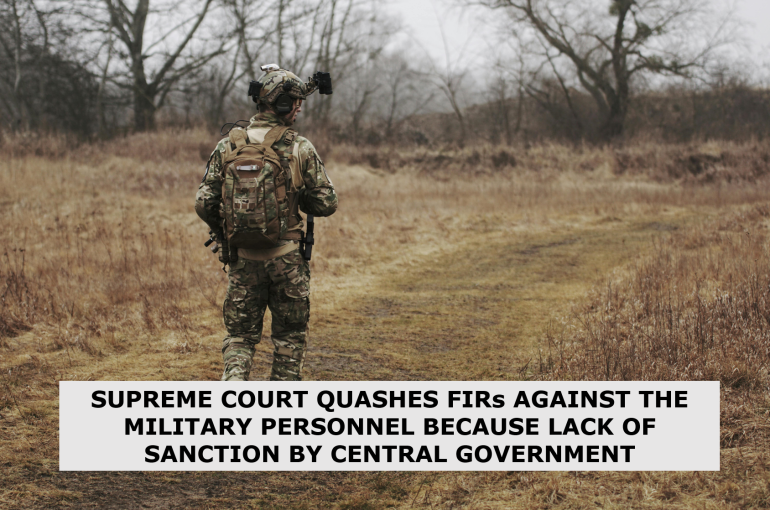SUPREME COURT QUASHES FIRs AGAINST THE MILITARY PERSONNEL BECAUSE LACK OF SANCTION BY CENTRAL GOVERNMENT
A two Judge Bench of the Hon’ble Supreme Court comprising of Justice Vikram Nath and Justice Prasanna Bhalachandra Varale passed a judgement dated 17.09.2024 in the matter of Rabina Ghale & Anr. v. Union of India & Ors. Writ Petition (Criminal) No. 265 and 250 of 2022 wherein the Bench held that FIRs can be quashed if there is lack of sanction by the Central Government under Section 6 of the Armed Forces (Special Powers) Act, 1958 (Act) (Protection to persons acting under Act).
Facts
Two Criminal Writ Petitions were filed by the wives of 2 Indian Army Officers for quashing of Suo Moto FIR, bearing State Crime Police Station (SCPS) Case No.07/2021. The accused Army Officers were members of the Indian Army’s 21 PARA (SF) unit and were charged under Section 302 (Punishment for Murder), Section 307 (Attempt to murder), Section 326 (Voluntarily causing grievous hurt by dangerous weapons or means), Section 201 (Causing disappearance of evidence of offence, or giving false information, to screen offender), Section 34 (Acts done by several persons in furtherance of common intention) read with Section 120-B (Punishment for Criminal Conspiracy) of the Indian Penal Code, 1860 (IPC). The F.I.R arose from a, incident on 04.12.2021 in the Mon area of Nagaland, on 04.12.2021, where the Army soldiers have opened fire on a pick-van containing coal workers, believing them to be insurgents. As the crisis worsened, and several people were killed, including an Army personnel. The total death toll was thirteen civilians.
The Armed Forces (Special Powers) Act, 1958 is applicable to the place in Nagaland where the incident took place. The Act provides protection to persons who are acting under the Act and no prosecution or proceedings can be carried on against such persons without the sanction of the Central Government.
The Additional Solicitor General provided that no such sanction was provided by the Government to prosecute the Officers. Thus, as pet the Order dated 19.07.2022 passed by the above Bench stayed on the prosecution proceedings against the Officers until the sanction was passed by the Central Government.
Later, the Additional Solicitor General submitted that the Sanction under Section 6 of the Armed Forces (Special Powers) Act, 1958 (AFSP Act) has been declined by the Competent Authority vide Order dated 28.02.2023. The Solicitor General also requested for some extra time from the Hon’ble Bench to file their Affidavit and make submissions in the Court.
Issues
- Whether the criminal proceedings can be continued against the Army Officers, if they are protected under Section 6 of the Armed Forces (Special Powers) Act, 1958?
Decision of the Supreme Court
The Apex Court refused to take into consideration the pleadings made by the parties as Section 6 of the AFSP Act forbids any prosecution, litigation, or other legal action without the prior approval of the Central Government. Moreover, the Hon’ble Bench was also of the view that the Interim Order dated 19.07.2022 deserves to be made absolute and the proceedings arising from the impugned F.I.R must be quashed.
However, the Advocate General of State of Nagaland submitted that a Writ Petition was filed before the Supreme Court in, The State of Nagaland v. Ministry of Defence & Anr. (Criminal) Diary No. 17297 of 2024, wherein the Order of declining the sanction under Section 6 of the AFSP Act was challenged and if the sanction is provided, then the Officers could be prosecuted as per the relevant provisions.
Under the said issue, the Hon’ble Bench provided that if, in the future, the Central Government decided to grant sanction under AFSP Act, the proceedings could be revived and carried to their logical conclusion. Moreover, the Hon’ble Supreme Court declined to issue any directions for issuing disciplinary proceedings against the Armed Forces.
Conclusion
The Apex Court in present judgement completely relied upon the provisions of law and not on the facts of the case. The Apex Court quashed the FIR against the Petitioner’s husbands due to lack of sanction from the Central Government under AFSP Act, while leaving the door open for possible future legal proceedings if sanction was granted. Furthermore, the Hon’ble Bench held that the concerned wing of Armed Forces retains discretion over any internal disciplinary actions against their officers and thus Courts does not cannot issue directions in this regard.
ARJAV JAIN
ASSOCIATE
THE INDIAN LAWYER & ALLIED SERVICES





































Leave a Reply